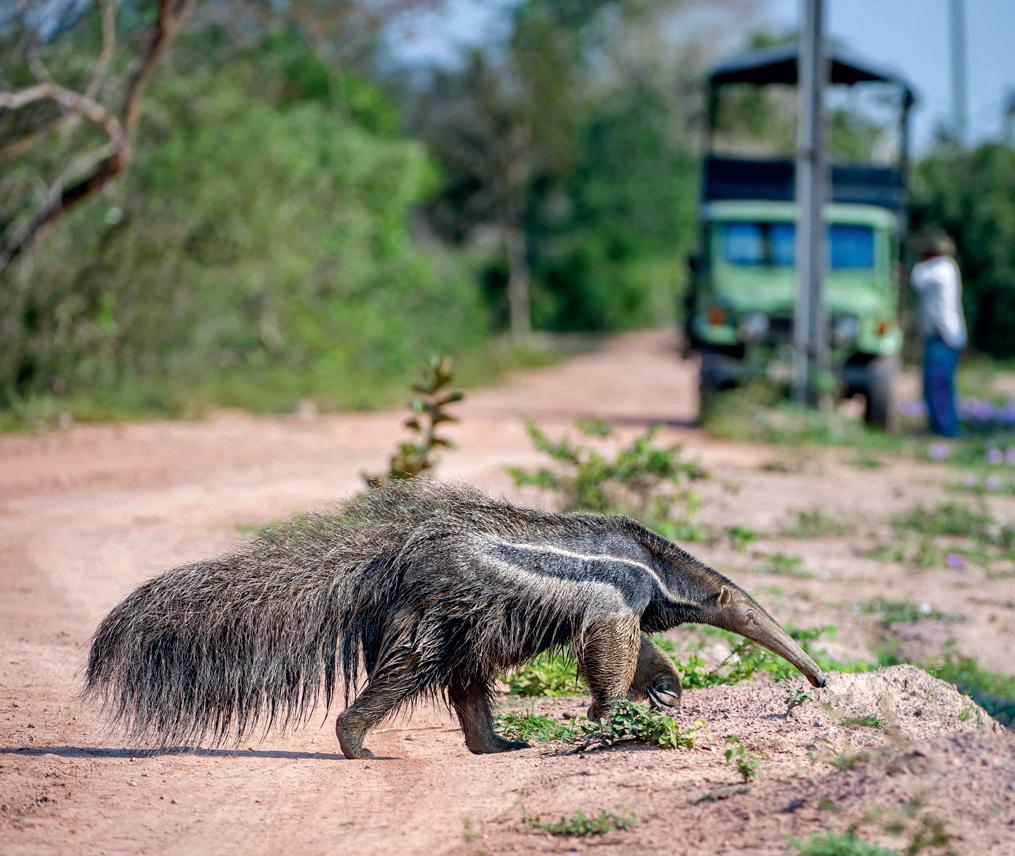
As the evening sky turns violet, the animals of the Pantanal gather near the water. Capybaras swim in tight formation, roseate spoonbills add smudges of pink to the riverbanks, the rumble of a jaguar pulsates from the forest.
This tropical wetland is the world's largest, stretching across Brazil, Paraguay and Bolivia, and hosts some of the greatest gatherings of animals anywhere. Now, scientists say the survival of the entire biome is at risk.
"The Pantanal is like Noah's ark. It is ... a place where those at risk of extinction can survive," said Pierre Girard, a professor at the Federal University of Mato Grosso. "That could be about to change. The Pantanal, as we know it, could soon cease to exist." The 17m hectare wild expanse harbours one of the world's most biologically rich environments, with at least 380 species of fish, 580 types of birds and 2,272 different plants. It is one of the main refuges for jaguars and houses a host of vulnerable and endangered species, including giant river otters, giant armadillos and hyacinth macaws.
But plans are under way to revive a project to turn the Paraguay River, one of the Pantanal's main arteries, into an industrial shipping route for crops such as soya beans and sugar.
Proponents say the waterway would reduce costs and time for exporting agricultural commodities but critics warn that its creation - which involves building new ports, possibly straightening bends and large-scale dredging - would cause irreversible damage to the wetland and wildlife.
"It seems a high price to pay: destroying the Pantanal, one of the world's unique systems, to reduce the price of grain," said Carolina Joana da Silva, a professor at Mato Grosso State University. "It is a war - a war which risks extinction." In a communal fishers' work shed in Cáceres, 64-year-old Elza Basto Pereira, the head of the community, said construction materials began arriving along the river six months ago.
Bu hikaye The Guardian Weekly dergisinin August 16, 2024 sayısından alınmıştır.
Start your 7-day Magzter GOLD free trial to access thousands of curated premium stories, and 9,000+ magazines and newspapers.
Already a subscriber ? Giriş Yap
Bu hikaye The Guardian Weekly dergisinin August 16, 2024 sayısından alınmıştır.
Start your 7-day Magzter GOLD free trial to access thousands of curated premium stories, and 9,000+ magazines and newspapers.
Already a subscriber? Giriş Yap

Cutting a dash
Scissor Sisters are reuniting to celebrate 20 years since their debut album. They talk fans, Elton John and connecting with the UK's weird’ energy

How art led resistance to Pakistan's dictatorship
A dazzling exhibitionin Qatar reveals how the repressive regime of Zia-ul-Hag led prompted a powerfulcreative defiance

The death of the middleclass professional spells danger for Labour
What does it mean to have a middle-class, white-collar professional job?

I love travelling Europe by train, but a joined-up approach is needed
Last August, I took the train from Trieste to Ljubljana, following a route once used by the Orient Express.

How will 2025 turn out? The life of Jimmy Carter offers us a clue Jonathan Freedland
How will we look back on 2025? Or, if that seems too absurd a question to ponder just a few days into the new year, how might we view the first quarter of the 21st century? As it happens, the answer to both questions is the same and it was confirmed by an event that came as the old year faded and the new one began.

15 ways to overcome overwhelm
Readers and wellbeing experts share tips on corralling chaos and avoiding anxiety, from journalling to cherishing nature

Overwhelmed? Here's how to fix it
Modern life is exhausting. Here, Guardian writers explain what they have given up to make space in their schedules and lives from social media to makeup to news addiction. Then, readers and experts offer tips on how to navigate the demands and pressures we all face. First, Emine Saner examines why we are so overwhelmed

Seoul standoff Impeached president fights on despite arrest attempt
South Korean anticorruption officials attempting to arrest the country's suspended president, Yoon Suk Yeol, must know by now what he meant by his repeated vows to \"fight to the end\".

'Don't feed the troll': European leaders hit back at Musk
When the German chancellor, Olaf Scholz, was asked in an interview about the barrage of insults being directed at him and other German leaders by Elon Musk, the world's richest man, his reply was: \"Don't feed the troll.\"

History lessons The two steps that could stop societal collapse
Academic Danilo Brozović says studies of failed civilisations all point in one direction-the need for radical transformation to survive